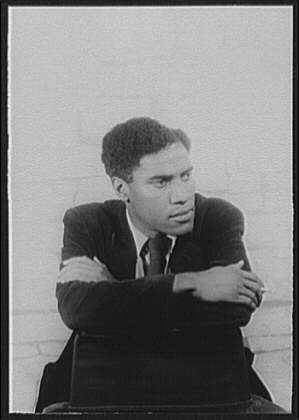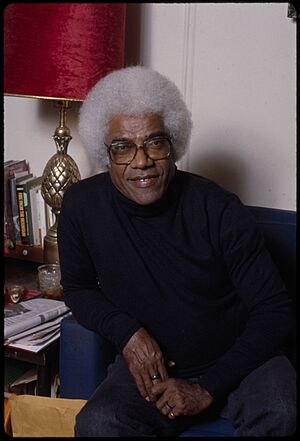George Lamming facts for kids
Quick facts for kids
George Lamming
OCC
|
|
|---|---|

Photo of Lamming by Carl Van Vechten, 1955
|
|
| Born | George William Lamming 8 June 1927 Carrington Village, Barbados |
| Died | 4 June 2022 (aged 94) Bridgetown, Barbados |
| Occupation |
|
| Nationality | Barbadian (Bajan) |
| Notable works |
|
| Spouse |
Nina Ghent
(m. 1950, divorced) |
George William Lamming (born June 8, 1927 – died June 4, 2022) was a famous writer from Barbados. He wrote novels, essays, and poems. He received the OCC, which is a very high award in the Caribbean.
George Lamming became well-known for his first novel, In the Castle of My Skin, published in 1953. He also taught at universities like Duke University and Brown University. He gave many talks around the world.
Contents
Early Life and Education
George William Lamming was born on June 8, 1927, in Carrington Village, Barbados. His family background was a mix of Afro-Barbadian and English heritage. After his mother married his stepfather, George lived in both Carrington Village and St David's Village.
He went to Roebuck Boys' School and then Combermere School. He earned a scholarship to attend Combermere, which helped him pay for his studies. His teacher, Frank Collymore, encouraged him to read and write. Collymore also started an important Caribbean magazine called BIM.
His Career as a Writer
From 1946 to 1950, George Lamming worked as a teacher in Port of Spain, Trinidad. He taught at El Colegio de Venezuela, a boarding school for boys. After that, he moved to England in 1950. For a short time, he worked in a factory there.
He later wrote about why he and other West Indians moved to England:
"Migration was not a word I would have used to describe what I was doing when I moved with other West Indians to England in 1950. We easily thought we were going to an England that had been painted in our childhood consciousness as a heritage and a place of welcome. It is the measure of our innocence that neither the claim of heritage nor the expectation of welcome would have been seriously doubted. England was not for us a country with classes and conflicts of interest like the islands we left. It was the name of a responsibility whose origin may have coincided with the beginning of time. ...
"The emigrants were largely men in search of work. My friend and fellow traveller, the late Samuel Selvon of Trinidad, was a poet and short-story writer then halfway through his first novel, A Brighter Sun. Sam and I had left home for the same reason - to make a career as a writer. This was a journey to an expectation, and between 1948 and 1960 every West Indian novelist of significance within their region made a similar journey: Wilson Harris, Edgar Mittleholzer, Ian Carew of Guyana, Roger Mais, Andrew Salkey and John Hearne of Jamaica.
This quote shows that many Caribbean writers, including Lamming, moved to England to become professional writers. They hoped to find more opportunities there.
In 1951, Lamming started working as a broadcaster for the BBC Colonial Service. His writings appeared in Bim magazine. His poems and short stories were also broadcast on the BBC's Caribbean Voices radio show. He even read poems by other young writers, like Derek Walcott, on the show.
His First Novels
George Lamming's first novel, In the Castle of My Skin, was published in London in 1953. It won an award called the Somerset Maugham Award. Famous writers like Jean-Paul Sartre and Richard Wright praised the book. Richard Wright even wrote an introduction for its U.S. edition.
Lamming said about his first book: "I tried to reconstruct the world of my childhood and early adolescence. It was also the world of a whole Caribbean society." This means he wrote about his own childhood and the society he grew up in.
He received a Guggenheim Fellowship, which helped him become a full-time writer. He started traveling a lot, visiting the United States, the West Indies, and West Africa.
His second novel, The Emigrants, came out in 1954. This book is about the journey of migrants and how they settled in new places. A review described it as "very thought-provoking." It showed how Black people searched for their place in the world.
Returning Home
Lamming lived in England for over ten years. However, unlike some other writers who stayed in London, he returned to Barbados. He became an important voice for his newly independent country. He wanted to help his country tell its own story.
He was inspired by the historian C. L. R. James. Lamming felt it was his job to address past wrongs, protect his native culture, and help create a shared future for his people.
Teaching and Later Career
In 1967, Lamming started teaching at the University of the West Indies in Mona, Jamaica. He was a writer-in-residence and lecturer. Later, he was a visiting professor at many universities in the United States, including the University of Texas at Austin, the University of Pennsylvania, and Cornell University. He also lectured in Denmark, Tanzania, and Australia.
In 2012, he was the head judge for the OCM Bocas Prize for Caribbean Literature. He also served as chief judge for the Walter Rodney Awards for Creative Writing in 2014.
George Lamming passed away in Bridgetown, Barbados, on June 4, 2022. This was just four days before his 95th birthday.
His Books
George Lamming wrote six novels:
- In the Castle of My Skin (1953)
- The Emigrants (1954)
- Of Age and Innocence (1958)
- Season of Adventure (1960)
- Water with Berries (1971)
- Natives of My Person (1972)
His first novel, In the Castle of My Skin, tells the story of a character named G. It's a coming-of-age story about growing up. It also tells the story of the Caribbean region. His second novel, The Emigrants, continues the story of the same character as he travels from Barbados to England.
Of Age and Innocence and Season of Adventure take place on a made-up Caribbean island called San Cristobal. Water with Berries (1971) explores problems in West Indian society. It uses ideas from Shakespeare's play The Tempest.
About his last novel, Natives of My Person, writer Jan Carew said it was Lamming's "finest novel." He said it helped show new parts of the colonial past that had not been explored before.
Many of Lamming's books were out of print by the late 1970s. Then, a publisher called Allison and Busby reissued them. This included his 1960 collection of essays, The Pleasures of Exile. In this book, Lamming tried to explain the place of West Indians in the world after colonialism. He used Shakespeare's The Tempest and its characters, Prospero and Caliban, to talk about identity and Caribbean history.
He also wrote a later collection of essays in 1995 called Coming, Coming Home: Conversations II – Western Education and the Caribbean Intellectual.
Awards and Recognition
In 2008, George Lamming received the highest award from the CARICOM, called the Order of the Caribbean Community (OCC). This award honored his "extraordinary engagement" in showing Caribbean identities and healing past wounds. CARICOM praised his "intellectual energy" and his dedication to freedom.
Brown University held a two-day event in March 2011 to celebrate Lamming's work.
In May 2011, the National Union of Writers and Artists of Cuba (UNEAC) gave Lamming the first Caribbean Hibiscus Award for his life's work. In 2014, he received a Lifetime Achievement Prize from the Anisfield-Wolf Book Awards.
A school in Barbados, George Lamming Primary School, was named in his honor. It opened on September 2, 2008.
His work is also celebrated through the George Lamming Pedagogical Centre. This center holds annual lectures in June, the month of his birth. His personal collection of writings is kept at the Sidney Martin Library at the University of the West Indies in Barbados.
Lamming's first novel, In the Castle of My Skin, was very important to the people of Barbados. The Prime Minister of Barbados, Mia Mottley, said that "none of his works touches the Barbadian psyche like his first." This book was also included in the "Big Jubilee Read" list of 70 books by Commonwealth authors in June 2022. This list celebrated the Platinum Jubilee of Elizabeth II.
When he died, Prime Minister Mottley called him a national hero. She said he was "the quintessential Bajan" (meaning a perfect example of a Barbadian). She added that "Wherever George Lamming went, he epitomised that voice and spirit that screamed Barbados and the Caribbean."
Published Works
Novels
- In the Castle of My Skin (London: Michael Joseph; New York: McGraw-Hill, 1953)
- The Emigrants (London: Michael Joseph; New York: McGraw Hill, 1954. London: Allison & Busby, 1980)
- Of Age and Innocence (London: Michael Joseph, 1958; London: Allison & Busby, 1981)
- Season of Adventure (London: Michael Joseph, 1960; Allison & Busby, 1979; Ann Arbor: University of Michigan Press, 1999)
- Water with Berries (London: Longman, 1971; New York: Holt Rinehart, 1972)
- Natives of my Person (London: Longman; New York: Holt Rinehart, 1972. London: Allison & Busby, 1986)
Non-fiction
- The Pleasures of Exile (London: Michael Joseph, 1960; Allison & Busby, 1981; Ann Arbor: University of Michigan Press, 1992)
- Coming, Coming Home: Conversations II – Western Education and the Caribbean Intellectual (Philipsburg, St. Martin: House of Nehesi, 1995, ISBN: 978-0913441480; in Spanish as Regreso, regreso al hogar: Conversaciones II, 2000)
- Sovereignty of the Imagination: Conversations III – Language and the Politics of Ethnicity (House of Nehesi, 2009, ISBN: 978-0913441466)
- Caribbean Reasonings – The George Lamming Reader: The Aesthetics of Decolonisation, edited by Anthony Bogues (Ian Randle Publishers, 2010, ISBN: 978-0913441480).
Anthologies
- Editor, Cannon Shot and Glass Beads: Modern Black Writing (London: Pan, 1974).
- Editor, On the Canvas of the World (Port of Spain: Trinidad & Tobago Institute of the West Indies, 1999.
Uncollected Short Stories
- "David's Walk", in Life and Letters (London), November 1948.
- "Of Thorns and Thistles" and "A Wedding in Spring", in West Indian Stories, ed. Andrew Salkey. London: Faber & Faber, 1960.
- "Birds of a Feather", in Stories from the Caribbean, ed. Andrew Salkey. London: Elek, 1965; as Island Voices, New York: Liveright, 1970.
- "Birthday Weather", in Caribbean Literature, ed. G. R. Coulthard. London: University of London Press, 1966.
Selected Awards
- 1954: Kenyon Review Fellowship
- 1955: Guggenheim Fellowship
- 1957: Somerset Maugham Award for In the Castle of My Skin
- 1962: Canada Council fellowship
- 1987: Companion of Honour of Barbados (CHB)
- 1998: Langston Hughes Medal
- 2003: Fellow of the Institute of Jamaica (IOJ)
- 2008: Order of the Caribbean Community
- 2009: The President's Award (St. Martin Book Fair)
- 2011: Caribbean Hibiscus Prize from UNEAC
- 2012: ALBA Cultural Award
- 2013: Clement Payne Appreciation Award
- 2014: Lifetime Achievement, the Anisfield-Wolf Book Awards
Images for kids
See also
 In Spanish: George Lamming para niños
In Spanish: George Lamming para niños
 | Delilah Pierce |
 | Gordon Parks |
 | Augusta Savage |
 | Charles Ethan Porter |



